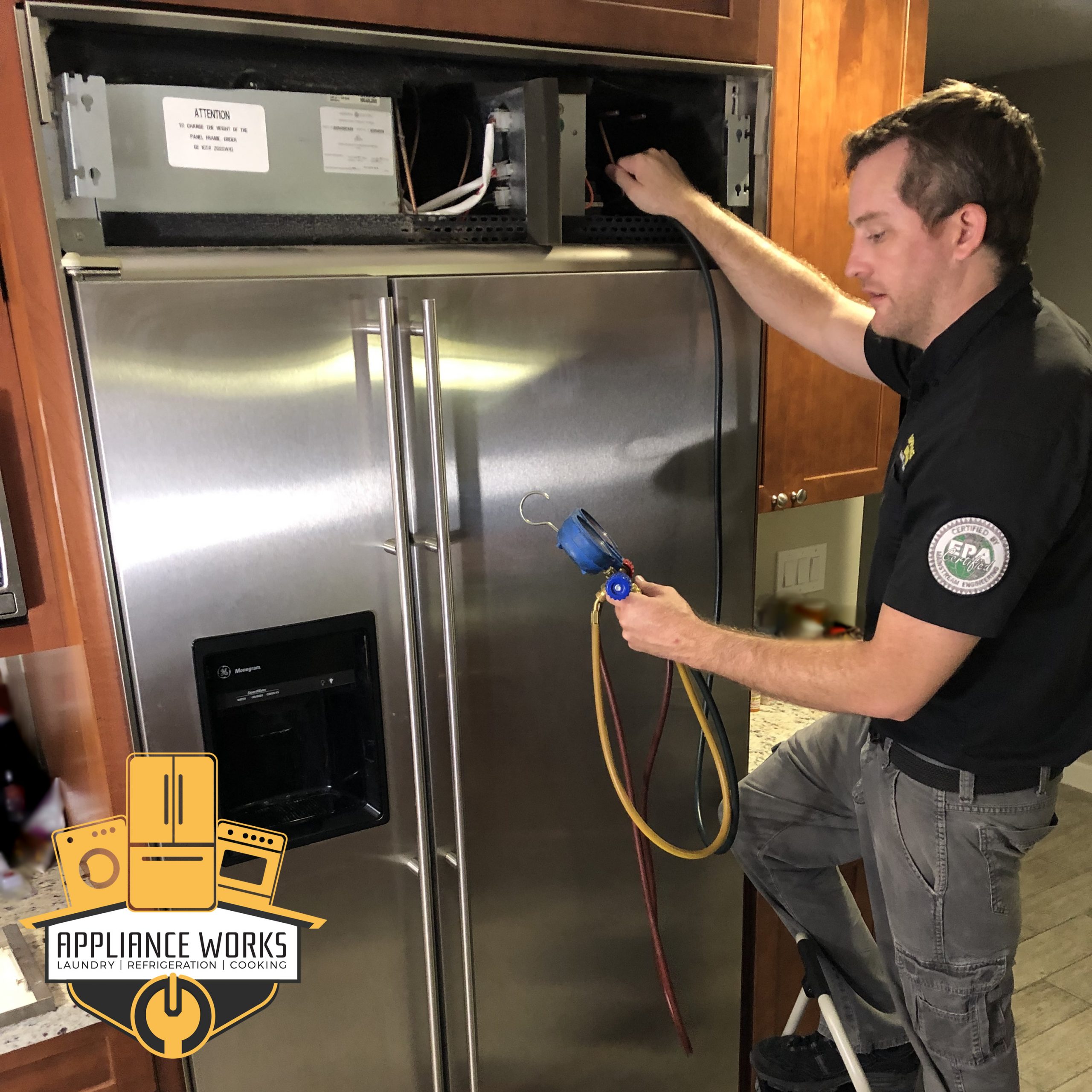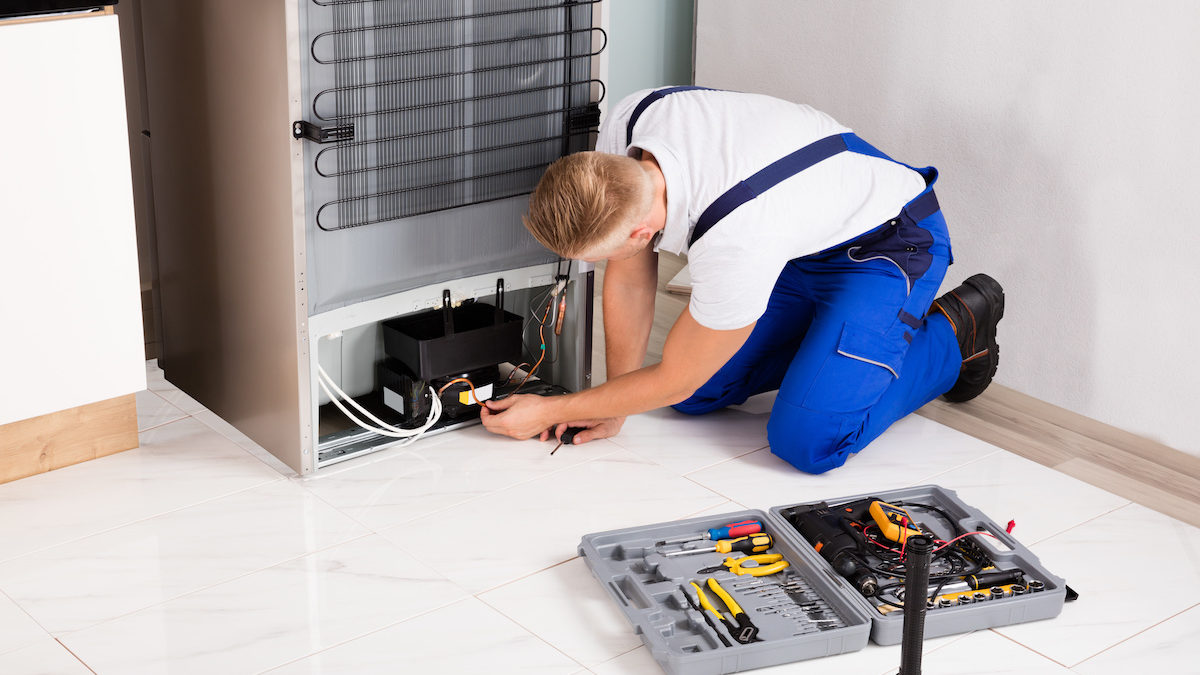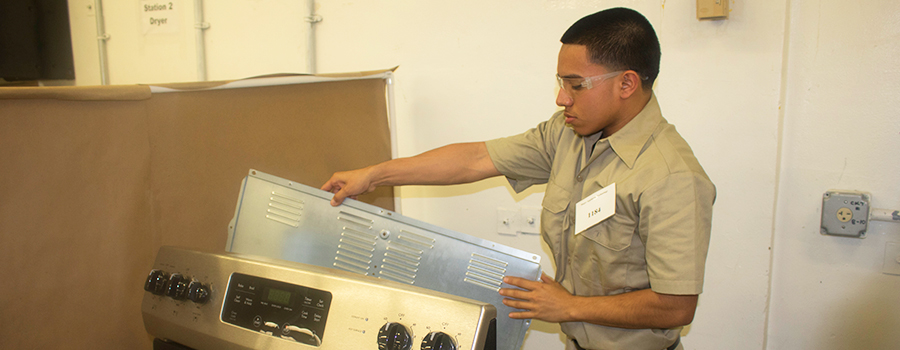Vital Tips for Effective Ref Repair Service to Expand Device Life Expectancy
When it concerns your refrigerator, proper fixing and upkeep are important for longevity. You might not recognize how small concerns can rise if they're left unaddressed. Routine examinations and straightforward repairs can conserve you from costly replacements down the line. Understanding typical troubles and knowing when to act can make all the distinction. Let's explore some important pointers that will certainly assist you keep your fridge running smoothly for years ahead.
Recognizing Usual Refrigerator Problems
Fridges are important in keeping your food fresh, yet they can encounter a range of usual problems that disrupt their efficiency. One constant problem is insufficient cooling. If you discover food ruining quicker than common, check the thermostat setups or take into consideration if the door seals are damaged. An additional typical problem is extreme sound, which can show a malfunctioning compressor or a stopping working fan. You may also experience water merging inside or below the fridge; this often arises from a clogged defrost drainpipe or a malfunctioning water line. Additionally, if your fridge's light isn't working, maybe an easy bulb issue or a problem with the door switch. Ice buildup in the fridge freezer can hinder air movement and cooling down efficiency. Acknowledging these concerns early can conserve you time and cash in repair services, guaranteeing your refrigerator runs efficiently and effectively.
Routine Maintenance Practices
To maintain your home appliances running efficiently, you need to remain on top of routine upkeep practices. Tidy the condenser coils, check the door seals, and keep an eye on the temperature level settings to ensure peak performance. These basic jobs can conserve you money and time on repair services down the line.
Clean Condenser Coils Routinely
Cleaning your condenser coils on a regular basis can significantly boost your home appliance's efficiency. Dust and dirt develop up on these coils in time, causing your home appliance to function tougher and consume more power. To maintain them tidy, disconnect your appliance and meticulously remove any protective covers. Use a vacuum cleaner with a brush attachment or a soft brush to gently get rid of debris. If needed, a mixture of cozy water and light detergent can help remove persistent gunk. See to it to let whatever dry entirely before reassembling and connecting the appliance back in. Objective to clean your coils at the very least twice a year, or regularly if you have pet dogs or reside in a dirty atmosphere. This simple job can extend the life expectancy of your home appliance considerably.
Examine Door Seals
3 simple actions can help you ensure your device's door seals remain in good condition. Initially, examine the seals routinely for any kind of fractures, rips, or indicators of wear. These problems can cause air leaks, affecting performance. Second, tidy the seals making use of cozy, soapy water to eliminate any debris or gunk. A clean seal assures a tight fit and far better performance. Ultimately, execute a straightforward test by closing the door on a paper. If you can conveniently draw it out without resistance, the seal could require changing. By following these steps, you'll maintain your appliance's effectiveness and durability, saving you money on energy expenses and fixings over time.
Monitor Temperature Setups
On a regular basis checking your device's temperature level setups is necessary for finest efficiency and efficiency. Utilize a thermometer to examine these setups frequently, specifically after major modifications, like moving your appliance or changing the thermostat. By remaining aggressive about temperature level surveillance, you'll guarantee your appliances run smoothly and last longer.
Troubleshooting Cooling Problems
When your refrigerator isn't cooling effectively, it can cause ruined food and threw away cash, so dealing with the problem promptly is important. Begin by inspecting the temperature setups to validate they go to the recommended levels, typically around 37 ° F for the fridge and 0 ° F for the freezer. If the settings are appropriate, examine the door seals for any type of gaps or damages; a faulty seal can allow cozy air to get in.
Following, analyze the vents inside the refrigerator and fridge freezer. Verify they're not blocked by food items, as this can interrupt air flow. Listen for the compressor; if it's not running or making unusual sounds, it might require attention. Inspect the condenser coils, normally located at the back or base of the device. Dirt and particles can collect, causing cooling down concerns. Tidy them with a vacuum cleaner or brush to enhance performance. If troubles continue, it could be time to call a specialist.
Taking Care Of Water Leak and Ice Build-Up
If you're managing water leak or ice build-up in your device, it's vital to recognize the source of the trouble. By identifying where the water is coming from, you can prevent additional issues and stay clear of costly fixings. Let's explore some effective methods to tackle helpful hints these usual issues.
Identify Leak Sources
Exactly how can you efficiently recognize the resources of water leak and ice build-up in your devices? Start by checking the seals and gaskets on your refrigerator and freezer doors. A used or damaged seal can permit warm air to get in, causing condensation and ice. Next, examine the drain frying pan and drain system for obstructions or blockages; a backed-up drain can cause water merging. Search for any kind of loose links in the water line, which can produce leaks. Check out the defrost drain for ice accumulation, which might interfere with appropriate drainage. By systematically inspecting these locations, you'll determine the resource of the problem, allowing you to take the required steps to repair it and prolong your device's life expectancy.
Prevent Ice Formation
To avoid ice development in your appliances, begin by verifying the temperature settings are appropriate. If your fridge or freezer is too chilly, it can result in extreme ice accumulation. Examine the door seals on a regular basis; harmed seals can let warm air in, creating condensation and ice formation.
Maintain the appliance well-ventilated and avoid overcrowding, as this can obstruct airflow - Washing Machine Repair Dependable Refrigeration & Appliance Repair Service. Also, regularly defrost your freezer if it does not have an automated defrost attribute.
If you notice water leakage, identify and take care of any obstructed drain holes, as they can add to ice build-up. Tidy the coils and verify they're working properly to preserve peak performance. Taking these actions will certainly help prolong your appliance's lifespan and effectiveness.
Attending To Noisy Fridge Sounds
While it may appear startling, a noisy refrigerator commonly signals minor issues rather than major breakdowns. Common offenders include the compressor, fans, and water lines.
Next, inspect for loose things inside. Occasionally, containers or shelves can rattle, producing unwanted noise. Tighten up or reposition them to get rid of the sounds.
If you notice a clicking noise, it may be the defrost timer. This is typically safe but can suggest it needs assessment.
An unbalanced device can generate vibrations and noise. Dependable Refrigeration & Appliance Repair Refrigerator repair specialist of Oro Valley. Dealing with these issues without delay can assist keep your refrigerator's efficiency and extend its life-span.
When to Replace Parts vs. Full Replacement

Nonetheless, if your appliance is older and experiencing several problems, a complete replacement might be extra affordable. Take into consideration the cost of repair work versus the appliance's worth. If fixings exceed 50% of a new system's rate, it's normally better to buy a replacement. Additionally, if you discover ongoing troubles that maintain recurring, it's an indicator that your appliance has reached completion of its life. Consider these factors thoroughly to make the finest choice for your demands and spending plan.
Recognizing When to Call an Expert
Just how can you inform when it's time to call in a specialist for home appliance repair? If your device quits working altogether or regularly trips circuit breakers, it's another red flag.
You must likewise consider your very own comfort degree with fixings. If you're unclear concerning identifying the issue or lack the right devices, my response it's best to connect for assistance. Bear in mind, attempting difficult fixings can cause more damages and even safety and security threats.

Frequently Asked Concerns
How Frequently Should I Tidy the Refrigerator Coils?
You must cleanse your refrigerator coils every six months. This assists keep efficiency and avoids getting too hot. If you see excessive dirt or pet dog hair, clean them much more often to ensure your refrigerator runs smoothly.

Can I Make Use Of Vinegar for Cleaning My Refrigerator?
Yes, you can make use of vinegar to clean your refrigerator! It's a superb all-natural cleanser that removes odors and stains. Who Repairs Dryers in Oro Valley? Dependable Refrigeration & Appliance Repair Service. Just mix it with water, apply it to surface areas, and clean down for a fresh, clean fridge
What Temperature level Should My Fridge Be Ready To?
You ought to set your fridge to 37 ° F(3 ° C) for suitable food conservation. This temperature level keeps your food fresh while avoiding spoilage, guaranteeing your groceries last longer and reducing waste. It's a very easy change you can make!
Does a Fridge Need to Be Leveled?
Yes, your refrigerator needs to be leveled. If it's irregular, it can impact cooling down effectiveness and trigger excess sound. Examine the progressing legs and change them to guarantee correct equilibrium for suitable efficiency.
Exactly How Can I Lower Fridge Energy Intake?
To reduce your refrigerator's energy intake, keep it tidy and well-ventilated, inspect door seals for leaks, established the temperature between 35-38 ° F, and stay clear of overwhelming it. These actions can significantly lower your power expenses.